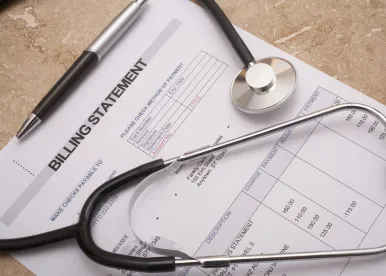On August 19, 2022, the US Departments of Health and Human Services, Labor, and Treasury, as well as the Office of Personnel Management, released a highly-anticipated final rule clarifying the procedures and considerations for resolving disputes related to surprise medical bills under the federal No Surprises Act (NSA).
The new rule is the Biden Administration’s effort to “fix” its previously-issued rule after a Texas federal court struck down portions of the prior interim final rule.
The final rule can be found here.
A Shift From the QPA
The NSA bars providers from sending patients so-called “surprise bills.” In certain circumstances where patients could not choose in-network providers, providers cannot bill patients for more than the patients would owe for in-network care. Importantly, the NSA sets forth a process for health care providers and insurers to settle disputes with respect to how much providers should be paid for out-of-network services. The statute calls for a “baseball” style arbitration, in which both parties submit “offers” — amounts they believe should be paid for the out-of-network medical care at issue — to certified Independent Dispute Resolution Entities (IDREs), who ultimately select one of the submitted offers.
Under prior versions of the rule, IDREs resolving out-of-network payment disputes were directed to choose the rate closest to the Qualifying Payment Amount (QPA), broadly defined as the median in-network amount paid by the payer for same or similar services in the same geographic area. IDREs were only then permitted to consider additional factors contemplated by the text of the NSA, including the provider’s training and experience, market share, the difficulty of providing the services at issue, and good faith efforts to enter network contracts and previous contracted rates, to determine whether those factors “clearly demonstrated” that the QPA was not the appropriate rate.
As detailed in prior alerts, provider groups had objected to that portion of the prior rule, arguing that imposing a “rebuttable presumption” in favor of the QPA and placing such heavy emphasis on that payer-specific amount went beyond the explicit terms of the NSA and unduly favored payers and lower reimbursement rates. Instead, provider groups contended that the additional statutory factors should be considered concomitantly with, and given equal weight as, the QPA. Ultimately, a federal judge in the US District Court for the Eastern District of Texas agreed, vacating portions of the previous rule that directed arbiters to select the offer closest to the payer’s QPA.
Given the Texas court’s decision, the Departments’ new rule rolls back the “rebuttable presumption” favoring the QPA. Under the new rule, IDREs are directed to consider the QPA and “all additional information submitted by a party to determine which offer best reflects the appropriate out-of-network rate.” Ultimately, the final rule favors a more holistic view, specifying that arbiters “should select the offer that best represents the value of the item or service under dispute after considering the QPA and all permissible information submitted by the parties.”
Down With Downcoding
The new rule also contains additional provisions designed to shore up the newly-reduced role of the QPA by addressing instances of “downcoding.” Downcoding occurs when payers change, add, or remove service codes from processed claims, which may result in payment of lower amounts. Under the new rule, payers must provide additional information related to “downcoded” claims, including a rationale or explanation justifying the downcode, and the amount that would have been the QPA had downcoding not been applied.
Looking Ahead: Clearing the Backlog of Eligible Claims
At bottom, the new rule appears to be more provider-friendly than the prior versions. However, more than 46,000 disputes have been filed since the Departments opened their online portal for submissions in April 2022, a figure far outpacing the Departments’ initial estimates for the entire first year.
Given the size of the backlog, the ultimate practical effects of the new rule remain unclear as providers wait for determinations. Providers should timely submit open negotiation notices under the NSA to payers, and then timely submit unresolved claims through the federal portal to ensure that their rights are preserved while the dust from the new rule settles and the Departments and IDREs work to clear the backlog.




 />i
/>i
